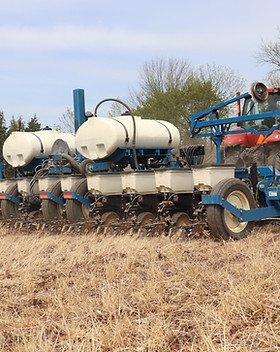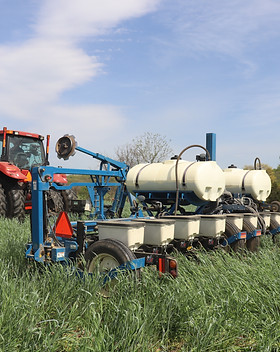
Innovative Strategies for Cover Crop Termination
ON-FARM SOIL HEALTH DEMONSTRATION & RESEARCH TRIAL
Farmer in Hunterdon Country NJ planting corn through 4' tall mix of overwintered rye, clover, and brassica cover crop.
Project Overview

Twenty-five northern New Jersey farmers are taking part in a 1500+ acre, on-farm soil health demonstration. Farmers will evaluate cutting-edge agricultural practices while North Jersey RC&D carefully analyzes their records, soils, and crops to determine long-term practice efficacy.
By identifying, documenting, and evaluating regionally successful cover crop termination approaches, this project will help farmers realize the full benefits of cover crops, encouraging additional soil health system adoption.
This is one of the largest studies in the nation systematically evaluating the soil health, economic and social impacts of these innovative practices -- and New Jersey farmers are leading the charge!
What is being studied?
The study examines how farmers can maximize the soil health and agronomic benefits of cover crops. Cover crops are typically grasses and clovers, seeded in the fall, destined not to be harvested -- but sown for the benefit of soil health. During the winter and early spring, cover crops suppress weeds, prevent soil erosion, help build and improve soil fertility and quality. Under traditional management, cover crops are killed through herbicide or tillage in the early spring, paving the way for corn, soybean, and vegetable crops. This trial will examine alternative termination strategies that not only boost soil health benefits but also increase profitability. Farmers enrolled in the study will commit to either (1) planting cash crops through green, growing cover crops, (2) grazing cover crops, or (3) using a roller-crimper to kill the cover crops.
These strategies maximize soil cover, biodiversity, and the presence of living roots in annual crop systems, ultimately increasing the agronomic and economic value of the cover crop. This study introduces New Jersey farmers to regenerative agricultural practices that aim to boost microbial activity, carbon retention, and water infiltration in the soil. The goal is to create resilient soil that requires fewer inputs to achieve greater profit.
Using a paired study design, these three methods will be compared against conventional termination and planting practices. As the study progresses, farmers will record what they did and what was the impact on cash crops. North Jersey RC&D staff will assess the effect of practices on soil health and farm profitability.

Project Purpose
Scientists and farmers agree that cover crops are critical to building farm resilience and combating climate change. However, most farmers terminate their cover crops early in the growing season, when the grasses are only a few inches tall. Killing the cover crops early in the spring simplifies management, and requires less specialized equipment, but farmers miss out on some of the benefits of cover crops. Delaying termination and therefore maximizing cover crop biomass production through strategies like "planting green" and roller-crimping may be a key to optimizing the economic and environmental benefit of cover crops. Delaying cover crop termination increases carbon sequestration, nitrogen-fixing, extreme weather soil protection, weed smothering, and cash crop protection.
Delayed termination is challenging and carries both potential risks and potential rewards. Termination needs to be timed carefully to maximize soil health gains without compromising crop yields. Specialized and expensive equipment is required. Without proper resources, poor cover crop termination can result in the cover crop becoming “weeds,” which can impede cash crop germination, lowering both yield and profit.
This study provides farm participants with the technical and financial assistance they need to successfully trial a new crop management practice. Coupling these farmers' insights and records with on-the-ground analysis of crops and soil will help to illuminate the impacts. This ultimately provides farmers with more tangible, real-world economic and agronomic value from cover crops, which is a key to increasing nationwide adoption rates.

Project Conclusions
This research trial is a direct investment in the soil health of 25 New Jersey farmers. The technical and financial assistance they receive, paired with real-world experience, will make them regional experts capable of guiding and assisting other farmers and serving as models for others to follow. Their experiences will allow us to assess the applicability and practicality of these novel practices to positively impact sustainability of farms -- both environmentally and economically.
Farmers without exception noted that the cost share assistance for equipment purchases and technical assistance were pivotal to their decision to implement new conservation practices, and that without these they likely would not have been able to adopt the new practice.
Many participants expanded the practice to acreage outside the original study and the vast majority of participants indicated their plans to continue the practice after the conclusion of the study.
-
No yield difference between BD and PG/RC, trended higher by 8% although not statistically significant.
Who's Involved
Twenty-five diverse farms are participating in this study, including grain farms, small- and mid-scale vegetable farms, and livestock operations, spanning over 1500 acres in northern New Jersey in Hunterdon, Morris, Warren, Somerset, and Sussex counties.
Farmers participating in the project are motivated by a desire to improve their soil health and long-term agricultural resilience. Farmers are provided with access to free technical assistance from leading crop consultants and experts and funds to purchase equipment and supplies, including high-end planter attachments, roller crimpers, and supplies for grazing. Through this grant, North Jersey RC&D will distribute over $640,000 in incentive payments to farmers.
BREAKDOWN BY OPERATION TYPE
-
Conventional Grain: 15 Farmers /
-
Organic Grain: 2 Farmers
-
Conventional Vegetable: 2 Farmers
-
Organic Vegetable: 2 Farmers
-
Beef Production: 3 Farmers
-
Dairy Production: 3 Farmer

Our Partners and Funders

North Jersey RC&D is leading the project and is responsible for project outreach and research. We are a non-profit dedicated to community needs through conservation. North Jersey RC&D works throughout Sussex, Warren, Hunterdon, Morris, Somerset & Union counties.


_0.jpg)

Other partners include Rosetree Consulting, Penn State Extension, and Kitchen Table Consultants. Our partners also include the farmers across northern North Jersey, without whose dedication to soil health and agricultural innovation this project could not run.
Funding is provided through the USDA’s Natural Resources Conservation Service (NRCS) inaugural CIG On-Farm Conservation Innovation Trial – a new feature of the 2018 Farm Bill. On-Farm Conservation Innovation Trials support more widespread adoption of innovative approaches, practices, and systems on working lands. Learn more about the CIG Conservation Innovation Trials.
Additional funding for the project was provided by the William Penn Foundation and National Fish and Wildlife Foundation.

Quick Facts
-
The USDA-NRCS CIG On-farm Research Trials are a new component of the 2018 Farm Bill.
-
North Jersey RC&D was awarded over $933,000 to fund the on-farm soil health demonstration. More than half the funding went to New Jersey Farmers to make the equipment upgrades required to implement innovative practices.
-
Twenty-five farmers, across Northern New Jersey, are enrolled in the research trial that includes some of the largest farmers in the state as well as small-scale farmers producing products for the community.
-
North Jersey RC&D will distribute over $640,000 in incentive payments to farmers. The funds aree used to upgrade planter and drills and purchase the roller-crimpers and fence necesarry to impliment the practices.
-
Farmers are trialing new agricultural practices that make farming more sustainable and farmland more resilient on over 1500 acres.
-
Farmers will evaluate cutting-edge agricultural practices (grazing cover crop, planting through green cover crop, and roller crimping cover crop) while North Jersey RC&D carefully analyzes their records, soils, and crops to determine the long-term practice efficacy.
Media Collection
The photos in this database are provided for free to educators for use, provided that proper attribution is used.
When using any of these photos or illustrations, whether in presentations, posters, or print materials, please credit, "Bridgett Hilshey, North Jersey RC&D".
Click on the image or video below to access the higher-resolution download.

Press Event
SPEAKERS
-
U.S. Senator Cory Anthony Booker
-
U.S. Representative Tom Malinowski
-
Douglas Fisher, New Jersey Secretary of Agriculture
-
Julie Hawkins, USDA-NRCS New Jersey State Conservationist
-
Multi-generational family farmers Steve and Cody Zamek
-
Neighboring farmers John Lima of Lima Family Farms, RJ Fulper of 4th generation Fulper Farms, and Dan Lyness of Spring Run Dairy
-
North Jersey RC&D, local nonprofit
WHEN
Friday May 21st at 11:00 AM
If you have additional questions about the project, reach out to:
Bridgett Hilshey at (908) 574-5368 or bhilshey@northjerseyrcd.org





























